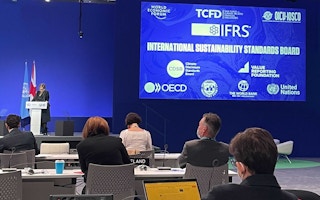Reporting companies are now required to disclose their Scope 3 greenhouse gas emissions, the International Sustainability Standards Board (ISSB) said, citing strong support for the move.
“Following careful analysis of the feedback on its proposed standards, the ISSB voted unanimously to require company disclosures on Scope 1, Scope 2 and Scope 3 greenhouse gas emissions,” the board said in a statement today. The rules are likely to be finalised by early 2023.
Scope 3 emissions, which include financed and supply chain emissions, cover indirect emissions related to goods and services that a reporting company produces or uses.
The ISSB also announced that it would develop relief provisions to help companies apply the Scope 3 requirements, which could include giving companies more time to provide the disclosures and “working with jurisdictions on so-called ‘safe harbour’ provisions”.
The announcement comes amid divisive views on whether Scope 3 emissions reporting should be made mandatory. A survey of 20 asset managers by investment research firm Morningstar this year revealed that while all agreed on the need for international convergence in sustainability reporting standards, they were split on whether mandatory disclosure of Scope 3 emissions was premature.
Eight of the respondents – including BNP Paribas, Capital Group, Legal & General, and Northern Trust – said that they believe Scope 3 reporting is “necessary for investors to develop a full picture of transition risk exposure and to evaluate investment risks and opportunities,” as asset management firm and respondent Wellington puts it.
However, firms including BlackRock, Invesco, State Street, T. Rowe Price, and Vanguard believe that the methodologies for disclosing Scope 3 emissions are not sufficiently mature to require mandatory disclosure by all companies at present, Morningstar said in a September report.
The ISSB said that it aims to complete deliberations on the proposed Sustainability Accounting Standards Board (SASB) standards around the end of 2022, and to issue the final standards “as early as possible” in 2023.
The ISSB’s October meeting focused on refining the drafts of its first two proposed sustainability-related disclosure standards, namely the International Financial Reporting Standards (IFRS) S1 General Requirements for Disclosure of Sustainability-related Financial Information and IFRS S2 Climate-related Disclosures.
Other key decisions made at the ISSB’s October meeting include modifying language in proposals that was not clearly understood, including removing the term “enterprise value” from the objective and assessment of materiality.
It has also removed the word “significant” when describing which sustainability risks and opportunities to disclose.
Going forward, the ISSB said that it would focus on foundational work supporting the adoption and application of its first two standards, including developing a digital taxonomy to enable digital reporting, and making targeted improvements to the proposed SASB standards to make them more internationally applicable.

















